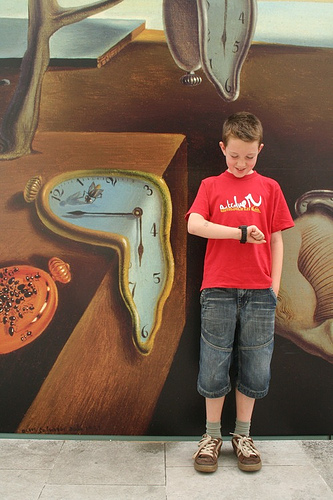
Is time finite and structured? Or, is it flexible, even fluid? Scientific and philosophical considerations aside, from the point of view of a pre-health advisor, it depends on whether you are applying to medical school this year or not. The application process begins more than a year before you enter medical school with lots of deadlines to meet. Once you decide to apply, time is not on your side. You may hope that if you are accepted you can defer admission, but it is the rare circumstance in which a medical school grants you an extra year before beginning your studies (p.s. come talk to a pre-health advisor about this if you are counting on a deferral). You may expect the clinical experience and grades you get after you submit your application to make a difference. This is not a great strategy, unless you truly believe that admissions folks have the time to continually review your application along with the thousands of others they receive.
Before you apply, on the other hand, you can take as much time as you need to build your application or do things that are not directly related to medical school. Everyone is different. Some people go to the medical school right after they graduate and that’s fine; however, there is nothing inherently “better” about going straight to medical school. The best time to apply to medical school is when your application is strong and you are committed to beginning your training to become a physician.
Here are some points to consider:
1. The application you submit, is the application that is reviewed. It is not a wise strategy to submit your application thinking that you will update the schools with all the great things you are going to do over the next year. By all means, stay active while you are in the process of applying and talk about your experiences if you are fortunate enough to have an interview, but don’t assume someone will revisit your application when you email those great fall grades or that extra letter of recommendation. A pre-health advisor can’t tell you whether you will get into medical school or not, but he or she can talk with you about the strengths and weakness of your application as well as the challenges of the admissions process.
2. Applying a second time to medical school can be challenging (not to mention expensive). If you turn around and apply the next year the schools are less likely to ask, “Who is this?” than “What’s different this time?”
3. Applying later in the application process puts you at a disadvantage. Yes, the official application deadline may be in October; however, if you submit your application then your chances of receiving an interview are considerably smaller than if you have applied by mid-summer.
4. Take the MCAT when you are prepared. This is not a test you want to “take a shot at.” Is it realistic to take the MCAT, start a new job, take two science classes, and find a new place to live in the same month? From what I’ve seen, it is not. It’s also worth noting that you don’t want to take the MCAT too early. If you are planning to take a significant amount of time before applying to medical school, check schools’ policies regarding the oldest MCAT that is acceptable.
5. Time spent strengthening your application is not a “black hole” or a personal failure. Taking some more time may not have been your plan. It may be, as I’ve heard students say, that you “have no idea what you would do” with that time. As pre-health advisors we present taking some time as an option, but it’s always your choice. Thinking through the possibility allows you to make an informed decision about the possible benefits and risks.
6. Is there anything that you, personally, want to do before you begin medical school? Once you enter medical school, and then the medical profession, the demands on your personal time will be significant. If there is another career you want to explore, a different call to serve that you wish to answer, or a desire to pursue a personal, non-academic experience, you may want to give yourself time to do that before making your commitment to becoming a doctor.
Keep in mind, of course, that you can make time to meet with a pre-health advisor by appointment or during walk-in hours. We never take time off! (Unless we are buried in snow, like today.)








